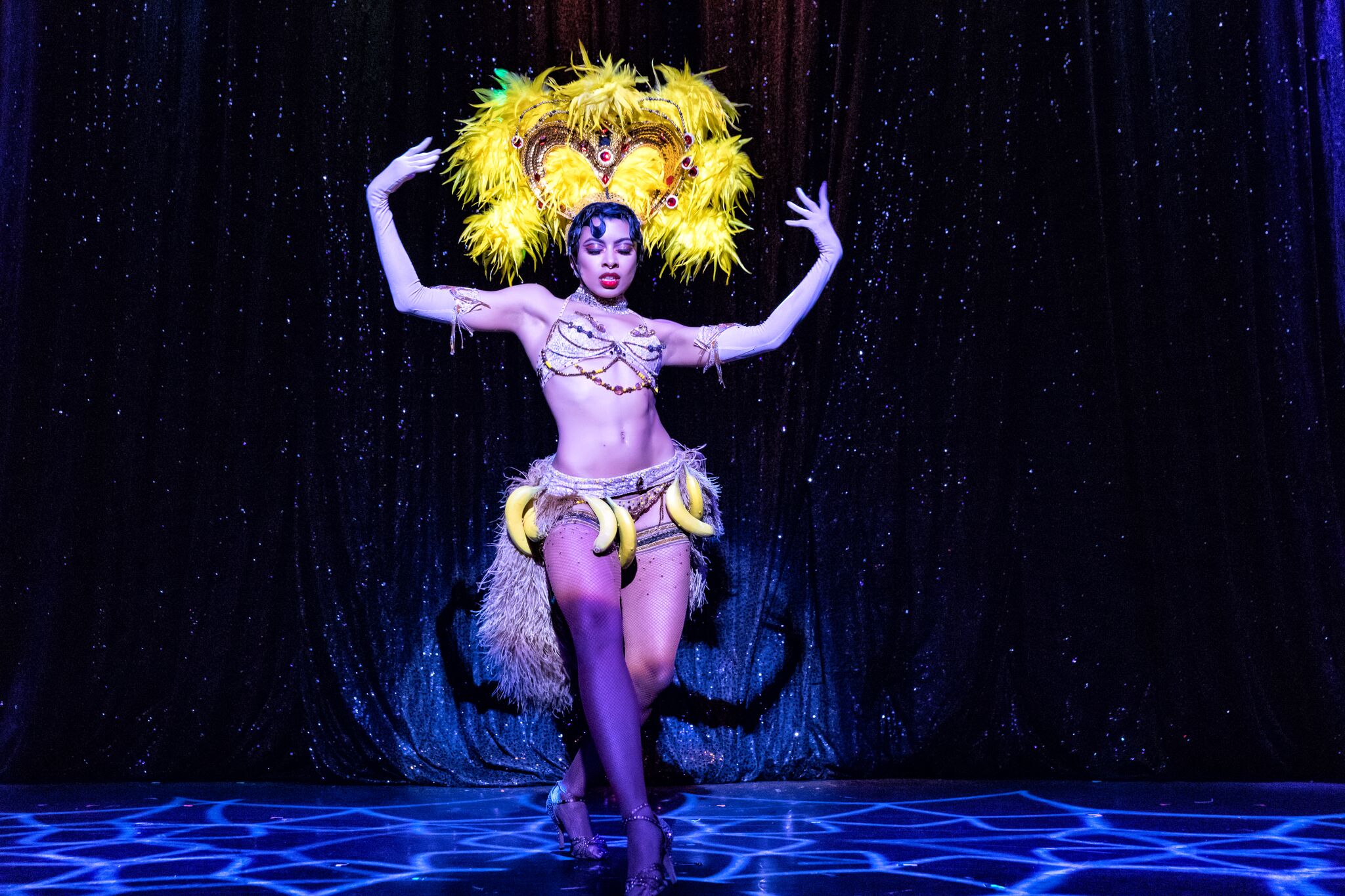What things her gaze conceals, yet gives acknowledgement to. What horrors, yet what joys. “Josephine Baker” I whisper to myself before shows, willfully propelling myself forward, no matter the obstacles. Others say Josephine is why they began their careers. What exactly did Josephine Baker give us, give this world, for which we pay homage to her at every interval, things for which she has and has not been acknowledged for?

Josephine Baker left the United States to escape extreme poverty and lack of upward mobility largely due to racism. She acquired fame and fortune in Paris beginning in the 1920s, while dancing in the production La Revue Negre. A dance entitled ‘Danse Sauvage’, in which Josephine was clad in nothing but a skirt made of feathers, introduced her to Parisian stage.

But it was the acclaimed banana dance in the La Folie Du Jour show at the Follies Bergère some time later that catapulted her to superstardom. Both of these dances were meant to discuss the black [dancing] body as the savage exotic other, but the dances and their dancer succeeded in celebrating and showcasing the beauty of the black body, of black skin, for the first time in history.
Striving for pretty sparkling things can be a worthy quest for many a woman, but those glittering gems can cover up so many ugly truths. What injustices Josephine endured throughout her career due to racism are widely known. Is it known that we pinups, burlesquers, and rockabilly gals of colour still endure the same discriminations and prejudices today, in a prettier, covert package?
Does Josephine know, and that’s why we are spurned on to fight oppression like she did, hoping for a loving community where we are accepted and our beauty acknowledged, at last? That time has not fully come. It has come in one in one thousand pinup publications having a brown body on its cover. It has come in ethnic dismissal as emails to publishers and editors go unanswered, or simply rejected with the words, “You are not pinup material.”

It has come in the idea, the image of a pinup, its ideal, of a rockabilly babe having porcelain skin, while dancing to music created by their brown counterparts as an expression of painful dire circumstances unknown to them, yet appropriated by them. It was once said that Josephine was the Black Venus. For you see, she couldn’t just be Venus; she had to be black first.
After many years and achieving notoriety overseas in Europe and the rest of the western world, Josephine Baker came back to the U.S. to perform. She was not met with open arms to American borders or stages by white showbusiness bosses. Instead she was literally turned away due to her brown skin; the very skin that had been fetshised in order to cement her celebrity status and fortune.
What pain she endured being turned away at the main hotel and stage doors, and having to enter through the back entrances, although she was the star of the show.
“Josephine gave me specifically the acknowledgement that I am a beautiful black woman – both in mind and in body. That my mind and body are actually perfect for pinup, burlesque, and any other genre, and no one can stifle me.”
While today we seek refuge in self-published pages that shout how gorgeous we are because we are so rarely seen in mainly Caucasian magazines, in the mainly Caucasian world of burlesque and pinup, Josephine gave more than the silly faces and animal like movements, stereotyping herself in order to gain employment.
She gave a narrative, a voice to her people, to all people, of beauty, of song, dance, elegance and strength. Josephine gives us the choice to learn, to move forward in agency, knowing we are more than a skirt of bananas. Josephine Baker gave us brown girls a sense of independence. She is forever the embodiment of enterprise, business savviness, and love of the arts, and all humanity. We can do whatever we want with our bodies. We can own ourselves.

Josephine gave me specifically the acknowledgement that I am a beautiful black woman – both in mind and in body. That my mind and body are actually perfect for pinup, burlesque, and any other genre, and no one can stifle me.
I strive forward, like Josephine: boldly, proudly. I work and seek to share my experiences and those of other women of colour, and increase visibility and aknowledgement about the things we have gone through historically due to racism, and that we must overcome still.
 The Irresistible O is a burlesque and pin up historian, known as the Sepia Queen of Burlesque, the Black Prima Ballerina of Burlesque, and the Pin Up Queen. She is the 2015 Burlypicks Michigan Master of Voice, 2015 Miss Pin Up Perfection, 2016 Miss Phobia Pin Up, the Inaugural Miss HotWheels Pinup, and the 2017 Burlypicks Master of Improv.
The Irresistible O is a burlesque and pin up historian, known as the Sepia Queen of Burlesque, the Black Prima Ballerina of Burlesque, and the Pin Up Queen. She is the 2015 Burlypicks Michigan Master of Voice, 2015 Miss Pin Up Perfection, 2016 Miss Phobia Pin Up, the Inaugural Miss HotWheels Pinup, and the 2017 Burlypicks Master of Improv.
O also instructs the world renowned History of Performers of Color in Burlesque course, and actively teaches and discusses the absence and history of women of color in the pinup, rockabilly, and burlesque genres. She also teaches all genres of dance, theater, and vocal arts.



